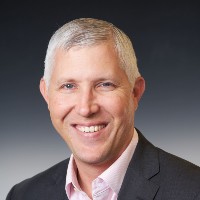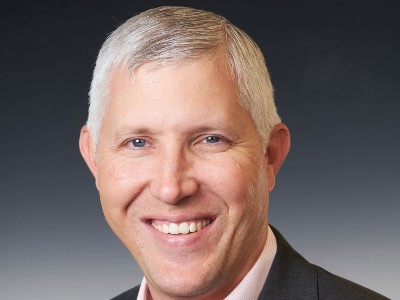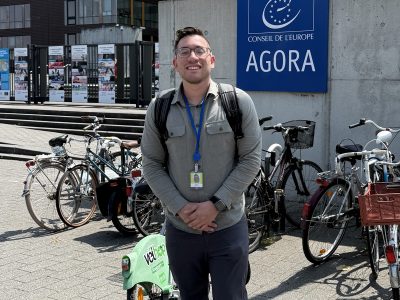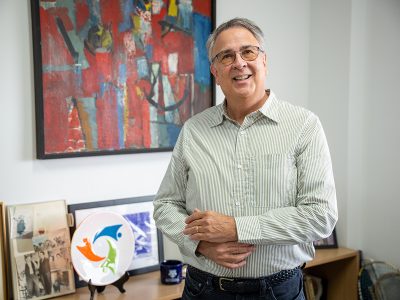Professor Dotger Awarded NSF Grant to Promote Data Sciences and STEM Workforce Development Through a Clinical Simulations Model
Professor Benjamin Dotger, director of the Syracuse University School of Education’s (SOE) Center for Experiential Pedagogy and Practice (CEPP), has been awarded a $300,000 National Science Foundation (NSF) grant to design and study an instructional model to enhance data science workforce development.
Dotger’s fourth NSF award, “The Simulation Physiology (SIM-Physio) Data Science Model: Engaging STEM Undergraduates in Data Science Practices” will provide undergraduates with hands-on training on how to ethically collect, analyze, and publicly communicate complex, human-generated data, gathered from subjects in CEPP’s clinical simulations programs.

Dotger is joined in the research project by co-principal investigators Tiago V. Barreira, associate professor of exercise science in the Falk College of Sport and Human Dynamics; Kevin S. Heffernan, associate professor of exercise science and director of the Human Performance Laboratory in the Falk College; and Melissa Luke, Dean’s Professor in the School of Education’s Department of Counseling and Human Services. Jeffrey Saltz, associate professor in the School of Information Studies, is a project advisor.
“The founding director of SOE’s new Center of Experiential Pedagogy and Practice, Professor Dotger has an impressive track record of securing NSF funding,” says Beth Ferri, professor of inclusive education and disibility studies and the SOE’s associate dean for research. “This SIM-Physio data science project is designed to help undergraduate students in STEM fields learn to collect and analyze and then communicate biomedical data to laypersons in a highly-structured, hands-on learning environment involving real-time data collection and analysis. The project—involving students and faculty from the School of Education, Falk College and iSchool—shows the CEPP’s potential to leverage Professor Dotger’s leadership in developing and implementing experiential learning models and applying them to an ever-widening set of instructional contexts, across the University and beyond.”
The SIM-Physio project will pair—one on one—undergraduates preparing to enter science, technology, engineering and mathematics (STEM) fields with real human subjects, drawn from students engaged in clinical simulations, a core research and practice component of CEPP, which was launched in March 2022. Clinical simulations consist of live and recorded interactions that approximate a challenging professional interaction, such as between a student teacher and a trained actor portraying a concerned parent. Currently, CEPP offers clinical simulations for teacher preparation, counselor education, and professional development for school leaders and military veterans navigating the college experience (VET-SIMS).
Because simulations reproduce challenging, high-stakes professional interactions, they offer ample opportunity for SIM-Physio students to collect physiological data. Learners in high-stakes environments often experience minor sign of stress, such as increased perspiration, respiration rates, blood pressure and heart rate. SIM-Physio students will be tasked with collecting and analyzing the physiological data—according to ethical human research guidelines—at seven points during a semester: a baseline measurement followed by six simulations. After analysis, each SIM-Physio student will be challenged to communicate the data back to the human subject they are paired with.
“STEM undergraduates planning to enter the fields of biology, data analytics, exercise science, neuroscience, nutrition science, pre-health/pre-med, psychology, and sports science must practice accurately collecting and analyzing human physiological data, as well as communicating complex data to the general public,” says Dotger. “This project’s fundamental objective—guiding STEM undergraduates in learning the three basic data science practices associated with human subjects—aligns with the National Science Foundation’s emphasis on developing the 21st century data science workforce.”
Derived from medical education’s use of standardized patients, the potential for clinical simulations to revolutionize professional training across multiple fields is explored in Dotger’s book, “Clinical Simulations as Signature Pedagogy: Educator Preparation Across the Disciplines” (Harvard, 2022), co-edited with SOE Interim Dean Kelly Chandler-Olcott. The book illustrates how simulations are deployed in mathematics and science education, physical education, educational leadership, counseling and inclusive education.
The SIM-Physio data science project represents an evolution of CEPP’s experiential learning model. “This project is centered on leveraging an existing learning environment—clinical simulations to prepare educators—and these students’ resulting physiological data in order to prepare STEM undergraduates who are learning basic data science principles,” says Dotger. “That’s two learning groups—teacher candidates and STEM undergraduates—impacted at the same time. Refinement of this data science pedagogical model offers opportunities to expand simulations into biomedical training programs.”
This project is a continuation of research that Dotger began in 2016—”Exploring Physiological Responses to Clinical Simulations”—funded in part by the SU Office of Research Internal Grant Program, a precursor to the CUSE Grant Program.
“This NSF award is an excellent example of the ongoing benefits of intramural grant funding,” says Interim Vice President for Research Ramesh Raina. “Professor Dotger has continued to grow and leverage a $7,500 institutional investment for a collaborative project with SUNY Upstate Medical University into a large interdisciplinary federal grant that broadens experiential STEM learning for our undergraduates.”
According to Dotger, “Investments in initial research allowed me and my collaborators to conduct a proof-of-concept and collect some pilot data, both of which were included in the broader NSF proposal.”



